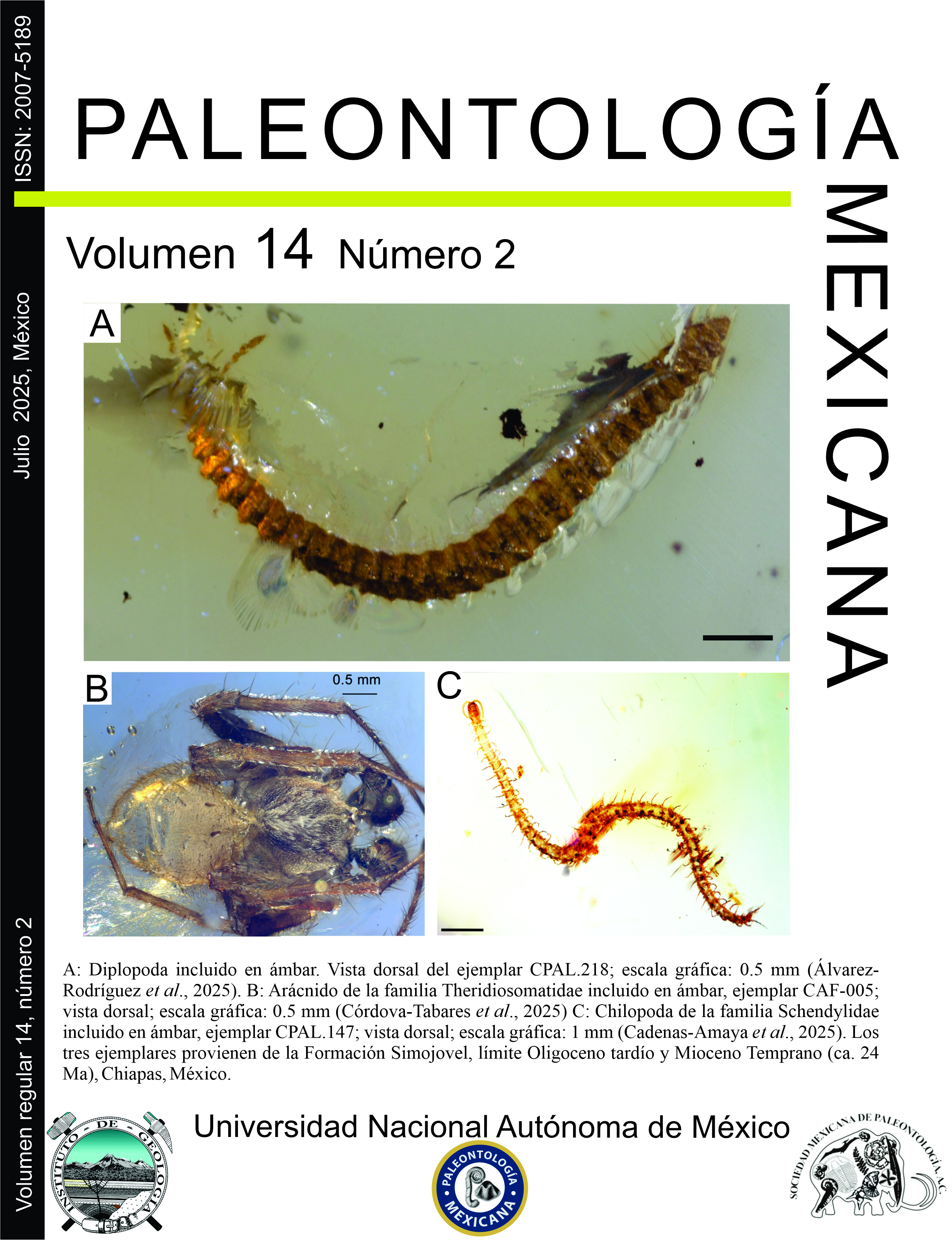First Record of a Ray Spider (Araneae: Theridiosomatidae) from Chiapas, Mexico
Main Article Content
Abstract
Among the spider inclusions in Mexican amber, a remarkable diversity is observed, highlighting the importance of their study for the country's fossil record. This work reports, for the first time, the presence of the family Theridiosomatidae in the fossil record of Mexico. The characteristics supporting this taxonomic assignment include the presence of a pair of sternal pits and a globose pedipalp. This new finding provides evidence for the diversity of spider fauna in the Miocene tropical forests of Chiapas.
Article Details

This work is licensed under a Creative Commons Attribution-NonCommercial-NoDerivatives 4.0 International License.
References
Allison, R. C. (1967). The Cenozoic stratigraphy of Chiapas, Mexico, with discussions of the classification of the Turritellidae and selected Mexican representatives (Doctoral dissertation). University of California, Berkeley, California.
Álvarez-Padilla, F., & Hormiga, G. (2011). Morphological and phylogenetic atlas of the orb-weaving spider family Tetragnathidae (Araneae: Araneoidea). Zoological Journal of the Linnean Society, 162, 713–879. https://doi.org/10.1111/j.1096-3642.2011.00692.x
Archer, A. F. (1953). Studies in the orbweaving spiders (Argiopidae). 3. American Museum Novitates, 1622, 1–27.
Clerck, C. (1757). Aranei Svecici. Svenska spindlar, uti sina hufvud-slagter indelte samt under nagra och sextio särskildte arter beskrefne och med illuminerade figurer uplyste. Stockholm: Laurentius Salvius.
Coddington, J. A. (1986). The genera of the spider family Theridiosomatidae. Smithsonian Contributions to Zoology, 422, 1–96. https://doi.org/10.5479/si.00810282.422
Coddington, J. A. (2017). Theridiosomatidae. In D. Ubick, P. Paquin, P. E. Cushing, & V. Roth (Eds.), Spiders of North America: An identification manual (2nd ed., pp. 270–271). American Arachnological Society, Keene, New Hampshire, USA.
Córdova-Tabares, V. M., & Riquelme, F. (2023). Annotated catalog of Arachnida in the fossil record of Mexico. Southwest Entomologist, 48(3), 605–628. https://doi.org/10.3958/059.048.0312
Dunlop, J. A., Penney, D., & Jekel, D. (2023). A summary list of fossil spiders and their relatives. In World Spider Catalog. Natural History Museum Bern. Retrieved April 1, 2025, from http://wsc.nmbe.ch
Eberhard, W. G. (1989). Niche expansion in the spider Wendilgarda galapagensis (Araneae: Theridiosomatidae) on Cocos Island. Revista de Biología Tropical, 37(2), 163–168.
Frost, S., & Langenheim, R. Jr. (1974). Cenozoic reef biofacies: De Kalb. Northern Illinois University Press.
Graham, A. (1999). Studies in neotropical paleobotany. XIII. An Oligo–Miocene palynoflora from Simojovel (Chiapas, México). American Journal of Botany, 86(1), 17–31. https://doi.org/10.2307/2656951
Juárez-Martínez, C., Córdova-Tabares, V., & Estrada-Ruiz, E. (2023). Primer registro de una inclusión de planta hepática del género Frullania (Frullaniaceae, Porellales) en el ámbar miocénico de Chiapas, México. Paleontología Mexicana, 12(2), 107–113. https://doi.org/10.22201/igl.05437652e.2023.12.2.353
Keyserling, E. (1886). Die Spinnen Amerikas. Theridiidae. II. Hälfte. Nürnberg: Bauer & Raspe.
Langenheim, J. H. (1966). Botanical source of amber from Chiapas, Mexico. Ciencia, 24, 201–210.
Langenheim, J. H. (2003). Plant resins: Chemistry, evolution, ecology and ethnobotany. Portland: Timber Press.
Penney, D. (2008). Dominican amber spiders: A comparative palaeontological–neontological approach to identification, faunistics, ecology and biogeography. UK: Siri Scientific Press.
Penney, D. (2015). A fossil ray spider (Araneae: Theridiosomatidae) in Cretaceous amber from Vendée, France. Paleontological Contributions, 10B, 1–8. https://doi.org/10.17161/PC.1808.15982
Pickard-Cambridge, O. (1894). Arachnida. Araneida. In Biologia Centrali-Americana, Zoology, 1, 121–144. London.
Pickard-Cambridge, O. (1896). Arachnida. Araneida. In Biologia Centrali-Americana, Zoology, 1, 161–224. London.
Pocock, R. I. (1892). Liphistius and its bearing upon the classification of spiders. Annals and Magazine of Natural History, 10(58), 306–314. https://doi.org/10.1080/00222939208677416
Riquelme, F., Alvarado-Ortega, J., Ramos-Arias, M., Hernández, M., Le Dez, I., Lee Whiting, T. A., & Ruvalcaba-Sil, J. L. (2013). A fossil stemmiulid millipede (Diplopoda: Stemmiulida) from the Miocene amber of Simojovel, Chiapas, Mexico. Historical Biology, 26(4), 415–427. https://doi.org/10.1080/08912963.2013.778843
Riquelme, F., Ortega-Flores, B., Córdova-Tabares, V., & Estrada-Ruiz, E. (2025). Zircon U–Pb ages of the Chiapas Amber-Lagerstätte in the uppermost Simojovel Formation, southwest Mexico. Canadian Journal of Earth Sciences, 62(6), 1088–1103. https://doi.org/10.1139/cjes-2024-0100
Rohlf, F. J. (2013). The tpsDig program, ver. 2.17 (software). The Stony Brook University, Stony Brook, New York.
Selden, P. A. (2010). A theridiosomatid spider from the Early Cretaceous of Russia. Bulletin of the British Arachnological Society, 15(3), 69–78. https://doi.org/10.13156/arac.2010.15.3.69
Simon, E. (1881). Les arachnides de France, Tome cinquième, première partie. Paris: Roret.
Smith, F. P. (1902). An introduction to British spiders. Science-Gossip New Series, 8(92–95), 234–332.
World Spider Catalog. (2025). World Spider Catalog (Version 26). Natural History Museum Bern. https://doi.org/10.24436/2
Wunderlich, J. (1980). Sternal-organe der Theridiosomatidae—eine bisher übersehene Autapomorphie (Arachnida: Araneae). Verhandlungen Naturwissenschaftlichen Vereins, Hamburg, 23, 255–257.
Wunderlich, J. (1988). Die fossilen Spinnen im dominikanischen Bernstein. Beiträge zur Araneologie, 2, 1–378.
Wunderlich, J. (2004). The fossil Theridiosomatidae (Araneae) in Baltic and Dominican amber. Beiträge zur Araneologie, 3, 998–1019.
Wunderlich, J. (2011). New extant taxa of the spider family Theridiosomatidae (Araneae) from Laos and on some fossil taxa. Beiträge zur Araneologie, 6, 427–444.
